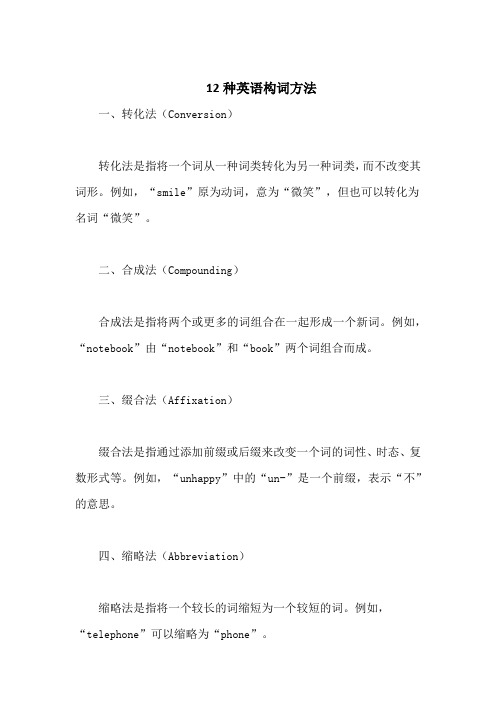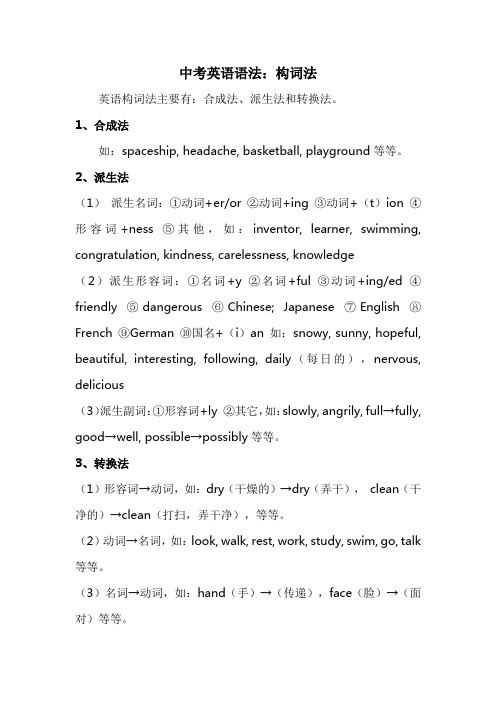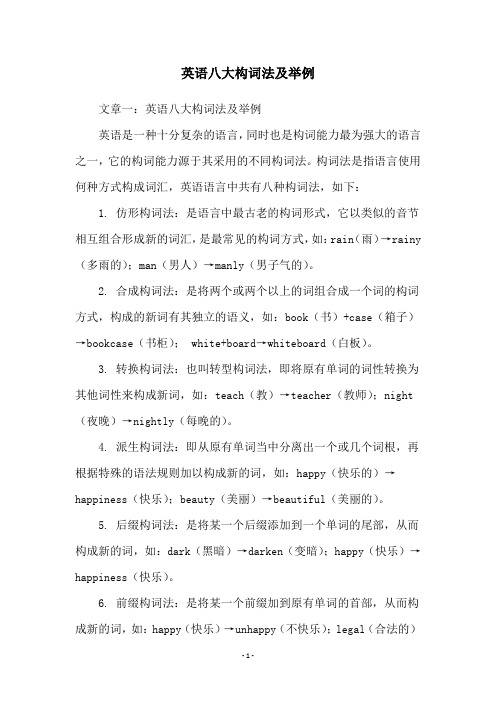中考英语构词法大全
12种英语构词方法

12种英语构词方法一、转化法(Conversion)转化法是指将一个词从一种词类转化为另一种词类,而不改变其词形。
例如,“smile”原为动词,意为“微笑”,但也可以转化为名词“微笑”。
二、合成法(Compounding)合成法是指将两个或更多的词组合在一起形成一个新词。
例如,“notebook”由“notebook”和“book”两个词组合而成。
三、缀合法(Affixation)缀合法是指通过添加前缀或后缀来改变一个词的词性、时态、复数形式等。
例如,“unhappy”中的“un-”是一个前缀,表示“不”的意思。
四、缩略法(Abbreviation)缩略法是指将一个较长的词缩短为一个较短的词。
例如,“telephone”可以缩略为“phone”。
五、逆生法(Backformation)逆生法是指将一个较长的词缩短为一个较短的词,并添加一个后缀来恢复原词的完整形式。
例如,“telecast”可以逆生为“broadcast”。
六、拟声法(Onomatopoeia)拟声法是指模仿声音来创造新词。
例如,“clang”模仿了金属碰撞的声音。
七、缀词法(Clipping)缀词法是指将一个词的前部分或后部分去掉,只保留中间部分。
例如,“ advertisement”可以缀为“ad”。
八、首字母缩写法(Acronymy)首字母缩写法是指将一组词的首字母组合成一个新词。
例如,“NATO”是“North Atlantic Treaty Organization”的首字母缩写。
九、混成法(Blending)混成法是指将两个或更多的词的部分混合在一起形成一个新词。
例如,“spaghetti”由“spaghetti”和“bottle”两个词混合而成。
十、词类转换法(Word Class Conversion)词类转换法是指将一个词从一种词类转换为另一种词类,同时改变其词形。
例如,“smile”可以转换为名词“smile”。
常见构词法归纳

常见构词法归纳1.派生法1前缀①表示否定意义的前缀:a. 纯否定前缀:un-: unable, unemployment失业, unload卸载, uncover发现、揭开、揭露, unhappy, untrue, unlike不像, unrest不安的,动荡的, unfair, unknown, unhealthy, unusual不寻常的;与众不同的, uncertain无常的、含糊的, unclear不清楚的, unequal, unlucky, unreal, unkind, uncomfortable, uneasy心情不安的, uninteresting, unimportant, unnecessary, unpleasant, undivided专心的、专一的、未分开的, unreserved 无保留的、坦白的dis-: dislike不喜欢, disarm解除武装;放下武器, disconnectvt拆开,使分离, disagree, disappear, disadvantage, dishonest, disability残疾、无能, discoverv发现, disobey违反、不服从in-, im-, il-, ir-: incapable不能的、无能力的, inability无能力,无才能, incomplete, incorrect, inconvenient, inexpensive, impossible, immoral不道德的, illegal非法的, illogical不合乎逻辑的, irregular, irrelative无关系的non-: non-smoker, non-stop直达的,中途不停的, non-violent非暴力的, nonwhite非白人, non-member 非会员, nonparty无党派, nonsense无意义,胡说,废话b. 表示错误的意义:mis-: mistake, mislead误导, misunderstandingn, misusen/vt滥用、误用、虐待, mistrust, mistreat 虐待c. 表示“反、防、抗”的意义:anti-: antiknockn/adj防震, antiforeign排外的, anti-waradj,反战的, antitank反战车的, anti-pollution防污染,反污染的②表示空间位置、方向关系的前缀:ward守卫a- 表示“在……之上”,“向……”:aboard在飞机上,在船上, aside在旁边de- 表示“在下,向下”:decrease减少,下降, degrade降级en- 表示“在内,进入”:encage入笼, enbed上床ex- 表示“外部,外”:exit, expand扩张, export输出、出口fore- 表示“在前面”:forehead前额, foreground前景, foreleg, forefootin-, im- 表示“向内,在内,背于”:inland内地、内陆, inside, indoors室内的,户内的;s在户内, import inter- 表示“在……间,相互”:international, interaction相互作用, internet, interview接见,面试mid- 表示“中,中间”: midposition中间位置out- 表示“在外部,在外”:outline轮廓,大纲,概要, outside, outwards外表、外面;s向外地, outdoors over- 表示“在上面,在外部,向上”:overlook忽视,眺望, overhead在头顶上,在空中, overcoat大衣,外套, overdress外衣, overseas海外post- 表示“向后,在后边,次”:postscript附言pre- 表示“在前,在前面,提前”:prefix前缀, preface前言, preposition介词super- 表示“在…..之上,超级”:superstructure上部建筑,上部构造, supernatural超自然的,不可思议的, superpower超强特权,超强大国, superman, supermarkettrans- 表示“移上,转上,在那一边”:translate, transform转变、转换、转移, transplant移植, transportation交通under- 表示“在…..下面,下的”:underline下划线,强调,在下面划线, underground, underwater, undershirt贴身内衣,美式up- 表示“向上,向上面,在上”:upwards向上的,上升的, uphold支撑,鼓励, uphill上坡,upload上传auto- 表示“自己,独立,自动”:automobile自动车, autobiography tba'grf自传tele- 表示“远离”:television, telephone , telegram电报, telegraph电报,抽象名词, telescope望远镜③表示时间,序列关系的前缀:fore- 表示“在前面,先前,前面”:foreword前言, forecast预报, foretell预言, foresee预见, foreknow 先知, foreknowledge先知mid- 表示“中,中间”:midnight, midsummer, mid-day, mid-autumn中秋节post- 表示“在后,后”:postwar战后的,战后时期, postgraduate研究生, postdate事后日期,推迟日期pre- 表示“在前,事先,预先”:preheat预先加热, prewar, prehistory史前, preview预习, prebattle, prepay预付re- 表示“再一次,重新”: retell复述, rewrite, renew续借, reconsider重新考虑, reuse, remarry, recycle再生,回收利用, rebuild重建,改造④表示比较程度差别关系的前缀:by- 表示“副,次要的”:byproduct副产品, bywork副业extra- 表示“超越,额外”:extraordinary非凡的,特别的over- 表示“超过,过度,太”:overeat吃过多, oversleep睡过头, overpraise过奖, overwork, overact 行为过分, overdo夸张,做得过分under- 表示“低劣,低下”:undersize尺寸不足, undergrown发育不全的, underproduction生产不足vice- 表示“副,次”:vice-president, vice –chairman,vice-monitor⑤表示共同,相等意思的前缀:co- 表示“共同,一起”:coexist共同生存, co-operate, co-worker, coactions合作行动, coauthor合作作者⑥表示某种状态,构成形容词、副词或动词:a- afraid, alive, alone, asleep, ashamed, aloud, ahead, aside, alike, awake⑦表示分离,离开意思的前缀:a- 表示“分离,离开”:away, apartde- 表示“离去,处去”:depart, decolour⑧表示“自我”:self- self-protection, self-made, self-knowledge⑨表示变换词类作用的前缀:be- befrienden- enslave束缚;征服, enable使能够, enrich使充实,使肥沃,使富足, enlarge扩大,使增大, encourage 鼓励⑩表示数量关系的前缀:a. 表示“单一”,“一”:uni- uniform统一服装, unicellular单细胞b. 表示“二,两,双”:bi- bicyclecycle循环,周期twi- twilight昏暗的,黎明c. 表示“半,一半”:semi- semiconductor半导体, semicircle半圆, semimonthly半月刊, semifinal半决赛d. 表示“百,百分之一”:centi- centimetere. 表示“千,千分之一”:kilo- kilometer, kilogram, kilowattf. 表示“微小”:micro- microvolt微伏特, microcomputer微机, microscope显微镜g. 表示“许多,复,多数”:multi- multimedia多媒体, multicolored, multiform, multinaturalh. 表示“千分之一、毫”:milli- millimeter, milligrami. 表示“微小、微型”:mini- minibus, miniskirt, minipark2后缀①名词后缀:a. 具有某种职业或动作的人:-an, -ian, -ician 表示“……地方的人,精通……的人”:American, Asian, Australian, Russian, Italian , historian历史学家, librarian图书管理员, electricia电工n, magician魔术师, technician, musician, politician政客-ant,-ent 表示“……人”:merchant, servant仆人,佣人, assistant, agent, student,-ee 表示“动作承受者”:employee雇员, examinee应试者, payee收款人, interviewee-eer 表示“从事于……人”:engineer, volunteer志愿者-er 表示“从事某种职业的人, 某地区,地方的人”:banker, observer, Londoner, villager singer, driver, writer, speaker, traveller, buyer-or 表示“……者”:author, doctor, operator, actor, visitor, inventor, educator-ar, -ary 表示“……的人, 从事……的人”:scholar, liar, beggar, secretary, missionary-ese 表示“……国人,……地方的人”:Chinese, Japanese, Cantonese广东人-ess 表示“阴性人称名词”:actress女演员, hostess女主人, manageress女经理-ist 表示“从事……研究者,信仰……主义者”:pianist, communist, dentist, artist, chemist, socialist, typist, receptionist-icist 表示“……家, ……者, ……能手”:physicist物理学家, phoneticist语音学家, technicist技术师-logist 表示“……学家,研究者”:biologist生物学家, geologist地质学家b. 构成具有抽象名词的含义:-age 表示“状态,行为,身份及其结果,总称”:courage, storage, marriage, percentage-al 表示“事物的动作,过程”:refusal拒绝, arrival, survival幸存, denial否认, approval批准,认可,赞成, trial实验-ance, -ence 表示“性质,状况,行为,过程,总量,程度”:importance, distance, avoidance逃避,废止, appearance, performance性能,绩效,表演, difference, obedience顺从,服从, presence出席,参加, existence -ancy, -ency 表示“性质,状态,行为,过程”:frequency频繁, urgency紧急, efficiency高效率,-ity 表示“性质,状态,程度”:purity纯度化学, reality, equality平等-bility 表示“动作,性质,状态”:ability, possibility, probability, responsibility-dom 表示“等级,领域,状态”:freedom, kingdom王国,界, wisdom智慧,才智-ery, -ry 表示“行为,状态,习性,性质”:bravery勇敢,勇气, slavery奴役-hood 表示“资格,身份, 年纪,状态”:childhood, girlhood少女时期, boyhood少年时代, manhood男子气概-ice 表示“行为,性质,状态”:notice, justice司法, service-ing 表示“动作的过程,结果”:building, writing, learning-ion, -ation, -ition, -sion 表示“行为的过程,结果,状况”:suggestion, action, solution, invention, direction方向,指导, correction改正,修正, collection, instruction指令,指示, destruction 破坏, introduction, congratulation , dictation听写,口述, invitation邀请, pronunciation, examination, graduation, operation, education, information, translation, starvation饿死,绝食, satisfaction, relation, determination决心,果断, preparation, imagination, explanation说明,解释, opposition反对, competition竞赛,比赛, description, decision, division除法, conclusion, impression印象, expression 表达,表示, admission承认, permission允许,许可, discussion-ment 表示“行为,状态,过程,手段及其结果”:disappointment失望, treatment, movement, judgment, punishment, argument, agreement协议, government, development, improvement改进,改善, requirement要求,必要条件, encouragement-ness 表示“性质,状态,程度”:goodnessadj,善良,精华, kindness, tiredness, friendliness友谊, business, illness, happiness幸福, willingness乐意,心甘情愿, weakness, fairness公平-ism 表示“制度,主义,学说,信仰,行为”:socialism社会主义, criticism批评, heroism英勇, tourism, communism共产主义 , Marxism马克思主义-ship 表示“情况,性质,技巧,技能及身份,职业”:hardship困苦,苦难, relationship, membership 资格,会员身份, friendship, ownership所有权, scholarship奖学金,-th, 表示“动作,性质,过程,状态”:strength, length, width, depth, wealth, truth, growth, warmth 温暖, youth-ure 表示“行为,结果”:exposure暴露, pressure压力, failure, procedure手续, mixture-craft 表示“工艺”:aircraft, needlecraft, woodcraftc. 带有场所,地方的含义:-age 表示“住所,地点”:village, cottage小屋,村舍-ary 表示“住所,场地”:library, granary 谷仓-ory 表示“工作场所,住处”:factory, dormitory, laboratory, observatory天文台,气象台②形容词后缀:a. 带有“属性,倾向,相关”的含义:-able, -ible: movable, comfortable, eatable, enjoyable, acceptable, reasonable, applicable可适用的, visible可见物, responsible, terrible可怕的, horrible恐怖的-al: natural, additional额外的,附加的, educational, national国家的,国民的-ant, -ent: distant, important, excellent-ing表示特征:令人觉得: moving, touching, daring, interesting, exciting, disappointing , boring, amazing-ed表示情绪:觉得: pleased, interested, surprised, worried, excited, bored, determined决定了的,果断的, delighted高兴的,欣喜的-ish: foolish, bookish出本上的,好读书的, selfish-ive: active, impressive感人的,令人钦佩的, decisive决定性的,果断的, active,expensive, progressive改革的,进步的b. 表示“相象,类似”的含义:-ish: boyish, childish幼稚的,孩子去的-like: manlike有男子气概的,像男子的, childlike天真浪漫的,像孩子的-some: troublesome麻烦的,讨厌的, handsome-y: milky, cloudy sunny, windy, rainy, foggy有雾的,模糊的, healthy, wealthy, worthy, bloody血腥的, funny, dirty, lucky, noisy, salty, smelly发臭的, hilly丘陵的,陡的-ly: manly, fatherly, motherly, sisterly, brotherly, daily, weekly, monthly, quarterly, yearly, friendly, lonely, orderly, lovely可爱的,令人愉快的, lively活泼的,生动的, likely很可能的, scholarly 博学的,学着风度的c. 表示“充分的”含义:-ful: beautiful, wonderful, helpful, truthful, successful, harmful, useful, careful, forgetful, merciful仁慈的,宽容的-ous: dangerous, courageous有胆量的,勇敢的, nervous紧张不安的, mountainous多山的, humorous诙谐的,幽默的, various各种各样的d. 表示由某种物质形成,制成或生产的含义:-en: wooden, golden, woolen羊毛的e. 表示方向的含义:-ern: eastern, western, southern, northern, southeastern, northwestern-ward: downward向下的, forwardf. 表示“数量关系”的含义:-teen: thirteen-ty: fifty-th: fourth, fiftiethg. 表示国籍,语种,宗教的含义:-an: Roman, European-ese: Chinese, Japanese-ish: English, Spanishh. 表示否定:-less: countless无数的,数不尽的, stainless不锈的, wireless, useless, endless无止境的,连续的, priceless无价的,贵重的, hopeless③动词后缀:-ize, ise 表示“做成,变成,……化”:modernize现代化, democratize民主化, organize, apologize, realize-en 表示“使成为,引起,使有”:quicken,加快 weaken, soften, harden变硬,变坚强-fy 表示“使……化, 使成”:beautify, purify净化, intensify, signify, simplify简化, satisfy④副词后缀:-ly: possibly, swiftly很快地, simply简单地-wards: downward, inwards向内地, upward向上地,上升地-ways: always, sideways向侧面的,一旁的-wise: otherwise另外的,否则,adj,adv, clockwise顺时针方向地注意:有的单词有双重后缀,如:use用途→useless无用的→uselessness无用self自己→selfish自私的→selfishness自私有的单词则是前后缀同时使用,如:important→importance→unimportanceregular有规律的,有规则的→irregular无规律的,不规则的→irregularity无规律,不规则2.合成法boyfriend, girlfriend, bus-driver, playground, radioactive放射性的, headmaster校长, sunshine, notebook, armchair扶手椅, wheelchair轮椅, postcard明信片, football, spaceship, blackboard, firefighter 消防队员, fireman, gateman看门人,售票员, chairman主席,会长, weatherman, businessman, armyman军人, postman, sportsman, bedroom, reading-room, classroom, newspaper, pickpocket扒手, she-goat雌性山羊,由三个词构成的合成形容词: heart-to-heart, two-year-old, eight-metre-long3.转化法1名词→动词hand手→传递back背部,后面→支持,后退charge费用→收费copy抄本,复印件→抄写,复印flood洪水→淹没heat热量→加热paint油漆→刷漆phone电话→打电话pin别针→装订 waste废物→浪费face脸→面对use用途→使用interest兴趣→使兴趣surprise惊讶→使惊讶taste味道→品尝smell气味→闻break短暂休息→折断present礼物→赠送2形容词→动词clean干净→使干净,打扫clear清楚→清理dirty脏→弄脏dry干燥→烘干,晒干empty空的→倒空free自由→使自由,释放slow慢的→放慢warm暖和→使暖和cool凉的→冷却quiet安静→使安静4.截短法缩略法截短法,即将单词缩写,词义和词性保持不变,主要有截头、去尾、截头去尾等形式; 1截头telephone→phone aeroplane→plane omnibus→bus2去尾mathematics→maths co-operate→co-op examination→examkilogram→kilolaboratory→labtaxicab→taxi3截头去尾influenza→flu refrigerator→fridge prescription→script 5.混合法混成法混合法,即将两个词混合或各取一部分紧缩而成一个新词;后半部分表示主体;前半部分表示属性;news broadcast→newscast新闻广播television broadcast→telecast电视播送smoke and fog→smog烟雾helicopter airport→heliport直升飞机场6.首尾字母缩略法首尾字母缩略法,即用单词首尾字母组成一个新词;读音主要有两种形式,即各字母分别读音;作为一个单词读音;very important person→VIP 读字母音要人;大人物television→TV 读字母音电视Testing of English as a Foreign Language→TOEFL托福练习动词变名词work---___________工作者 sing---___________歌手 teach---___________教师 drive---___________司机 write---___________作家dance---___________舞蹈家win---___________获胜者 run---___________赛跑者 swim---___________游泳者act---___________演员 collect---___________收藏家 direct---___________主管visit---___________参观者 invent---___________发明家 translate---___________翻译家educate---___________教育 describe---___________描述 predit---___________预言collect---___________收藏 invent---___________发明 build---___________建筑物mean---___________意思 meet---___________会议 cross---___________路口turn---___________转弯处 decide---___________决定 die---___________死亡fly---___________飞行 know---___________知识 please---___________高兴pronounce---___________发音 mix---___________混合物please---___________令人高兴的---___________感到高兴的surprise---___________令人惊讶的的 ---___________感到惊讶的excite---___________令人兴奋的 ---___________感到兴奋的interest---___________令人感兴趣的---___________ 感兴趣的worry---___________令人担忧的 ---___________感到担忧的amaze, annoy, bore, disappoint, embarrass, frustrate, relax, terrify, thrill, tire等形容词的变化;A: 形容词变副词;quick---____________ strong---____________ heavy---____________ angry---____________ happy---____________ lucky---____________ healthy---____________ noisy---____________ usual---____________ careful---____________ real---____________ successful---____________ terrible---____________ possible---____________B: 形容词变名词;Kind---____________ happy---____________ill---____________ safe---____________confident---____________ important---____________different---____________ true---____________high---____________巩固练习1. That man was ________enough not to tell the manager that he would not do the job.A. careB. carefulC. carelessD. carelessness2. The soldier died for saving the child,so his________ is heavier than Mount Tai.A. dieB. deadC. diedD. death3. The child looked ________at his brother who was badly wounded.A. sadlyB. sadnessC. saddlyD. sad4. He is an expert at chemistry. We all call him a ________.A. chemistryB. chemicalC. chemistD. physician5.The three- ________chair isn’t suitable for a young child. He may fall off.A. leggingB. leggedC. legsD. leged6. Stephenson became the________railway engineer in the world.A. leadB. leaderC. leadingD. leadership7.When the teacher praised him for working out the maths problem,Jack looked________about at his classmates.A. proudB. proudlyC. prideD. pridely8.To everyone’s ________,the girl finished the job quite well.A. satisfiedB. satisfactoryC. satisfyingD. satisfaction9.—What are you doing here—Oh,my teacher asked me to write a passage about ________in English.—You can write________passage in EnglishA. 600 words;a 600-wordsB. 600-word;a 600-wordsC. 600 words;a 600-wordD. 600 words;a 600-words10. No one should enter the spot without the________of the police.A. permitB. permissionC. permittingD. permittence11. You must come with us to the police ________.Our head is waiting for you.A. headquartersB. headlineC. headmasterD. headache12.Letting that animal escape was no accident;you did it ________.A. intendB. intentionC. intentionallyD. intentional13. The shop owner welcomed all the guests with a________smile.A. practiceB. practiseC. practicalD. practiced14. The________ordered him to pay a $100 fine.A. judgerB. judgmentC. judgeD. judgement15. My TV is out of order. Can you tell me what is the________news about Iraq WarA. latelyB. latestC. laterD. latter16. The Great Wall is more than 6000 li in ________.A. longerB. lengthC. longD. longing17.To my ________,I passed the exam easily.A. joyB. joyfulC. joylessD. joyness18. Canada is mainly an________country.A. English-speakingB. speak-EnglishC. spoken-EnglishD. English-spoken19. How________ he is He is always acting________.He is really a ________.A. foolish;foolishly;foolB. fool;foolish;foolC. foolish;fool;foolD. foolishly;foolish;fool20. The necklace that she lost is very expensive. It’s of great ________.A. valuableB. valueC. valuelessD. unvaluable21. There were________fish in the river in South America.A. in dangerB. dangerC. dangerousD. dangerless22.The letter “b” in the word “doubt” is________.A. soundB. silentC. silenceD. sounded23. The child looked at me________.A. strangerB. strangelyC. strangeD. strangeless24.The black people were against slavery and fought for their________bravely.A. freeB. freelyC. freedomD. frees25. What you said sounded________ but in fact it was untrue.A. reasonableB. reasonfulC. reasonlessD. unreason26. We have to learn ________technology from other countries.A. advanceB. advancingC. advantageD. advanced27. The children live in a village ________.They come here almost every day.A. nearbyB. nearC. nearlyD. near by28.Mr Black is an ________in the army,not an ________in the government. You can not easily find him in his________.A. official;officer;officeB. officer;office;officialC. official;official;officialD. officer;official;office29.You’d better give up smoking if you want to keep ________.A. healthB. healthyC. healthilyD. healthier30.________ speaking,I didn’t do it on purpose.A. HonestlyB. HonestC. HonestyD. Dishonest参考答案1-5 BDACB 6-10 CBDCB 11-15 ACDCB 16-20 BAAAB21-25 CBBCA 26-30 DA。
中考词汇常考构词法词汇整理

中考词汇常考构词法词汇整理1.加(-fUl)名词变T形容词;加(-less)变T反义beautybeautiful美丽的carecareful仔细的careless粗心的powerpowerful强大的powerless无力的useuseful有用的useless无用的helphelpful有助的helpless无助的thankthankful感激的thankless不感激的joyjoyful高兴的joyless不高兴的harmharmful有害的harmless无害的forgetforgetful健忘的peacepeaceful和平的wonderwonderful健忘的successsuccessful成功的plentyplentiful大量的2.加(-dis)变一(反义)appeardisappear消失,失踪like(v)dislike不喜欢honestdishonest不诚实的coverdiscover发现3.加(-un)变一(反义)healthyunhealthy不健康的happyunhappy不幸福的likeunlike不喜欢的usualunusual罕有的,异乎寻常的forgetunforgettable难忘的4.加(-im)变(反义)possibleimpossible不可能的politeimpolite不礼貌的5.加(-re)变一(重新;再次)buildrebuild重建tellretell复述cyclerecycle回收writerewrite重写turnreturn返回viewreview复习tiredretired退职6.加(-ist)变一人tourtourist旅游者sciencescientist科学家artartist艺术家physicsphysicist物理学家chemistrychemist化学家cyclecyclist汽车人journaljournalist新闻记者7.加(-er)变一人workworker工人announceannouncer广播员managemanager经理runrunner跑步者winwinner赢家designdesigner设计者passagepassenger乘客messagemessenger信使paintpainter画家organizeorganizer组织者ownowner拥有者traveltraveler旅行者publishpublisher出版者reportreporter记者prisonprisoner犯人speakspeaker演讲者writewriter作者receivereceiver接待者,接收器officeofficer官员waitwaiter/waitress侍者teachteacher教师strangestranger陌生人smokesmoker吸烟者robrobber抢劫者listenlistener听众customcustomer顾客deliverdeliverer邮差8.加(-or)变一人actactor/actress演员calculatecalculator计算器professionprofessor教授visitvisitor参观者9.加(-ant)变一人serveservant服务员assistassistant助手10.加(-ian)变一人librarylibrarian图书管理员musicmusician音乐家11.加(-y)名词变一形容词sunsunny晴天cloudcloudy多云snowsnowy下雪rainrainy下雨windwindy刮风funfunny好笑的,滑稽的noisenoisy吵闹的lucklucky幸运的healthhealthy健康的greedgreedy贪婪的hungerhungry饥饿的thirstthirsty渴的weightweighty重点crazecrazy狂热的sleep(feel)sleepy困的(fall)asleep睡着的12.加(-al)名词变一形容词traditiontraditional传统的historyhistorical历史的nationnational民族的professionprofessional专业的educationeducational教育的physicsphysical物理的medicinemedical医药的chemistrychemical化学的13.去(-ce)加(-t)名词变一形容词convenienceconvenient便利的differencedifferent不同的magnificencemagnificent壮丽的absenceabsent缺席的importanceimportant重要的coincidencecoincident巧合的14.加(-ly)名词变一形容词lovelovely可爱的friendfriendly友好地orderorderly整齐的lonelonely孤独的mainmainly主要的monthmonthly每月的15.加(-ous)名词变一形容词dangerdangerous危险的16.去(-ce)加(-se)名词变一动词practicepractise操练adviceadvise劝告17.加(-tion)动词变一名词,加(-tive)动词变一形容词attractattraction吸引力attractive有吸引力的attendattention注意attentive聚精会神的decoratedecoration装饰decorative可作装饰的protectprotection保护protective保护的calculatecalculation计算机collectcollection收集物educateeducation教育educative教育的congratulatecongratulation祝贺explainexplanation解释introduceintroduction介绍inventinvention发明inviteinvitation请柬locatelocation位置organizeorganization组织operateoperation手术,操作pollutepollution污染pronouncepronunciation发音recreaterecreation娱乐reducereduction减少solvesolution解决办法productproduction生产reciterecitation朗诵addaddition增加discussdiscussion讨论decidedecision决定18.加(-ment)动词变一名词amazeamazement惊奇amuseamusement娱乐argue argument争论announceannouncement通知arrangearrangement安排developdevelopment发展improveimprovement改进19.去(-ize)加(-y)动词变一名词apologizeapology道歉memorizememory记忆20.加(-able)动词变一形容词changechangeable多变的enjoyenjoyable有趣的reasonreasonable合理的forgetforgettable容易忘记的21.加(-ing或-ed)动词变一形容词amazeamazing令人惊讶的amazed吃惊的amuseamusing好玩的determinedetermined下决心的exciteexciting令人激动的excited激动的frightenfrightening可怕的frightened受惊的developdeveloping发展中的developed发达的hurryhurried急急忙忙的interestinteresting有趣的interested感兴趣的mixmixed混合的satisfysatisfying令人满意的satisfied满意的worryworrying令人担心的worried担心的pleasepleasing令人愉快的pleased愉快的woundwounded受伤的diedying垂死的confuseconfusing令人困惑的confused感到困惑的22.去(-e)加(-y)形容词变一副词possiblepossibly大概,也许probableprobably很肯能。
中考英语语法:构词法

中考英语语法:构词法英语构词法主要有:合成法、派生法和转换法。
1、合成法如:spaceship, headache, basketball, playground等等。
2、派生法(1)派生名词:①动词+er/or ②动词+ing ③动词+(t)ion ④形容词+ness ⑤其他,如:inventor, learner, swimming, congratulation, kindness, carelessness, knowledge(2)派生形容词:①名词+y ②名词+ful ③动词+ing/ed ④friendly ⑤dangerous ⑥Chinese; Japanese ⑦English ⑧French ⑨German ⑩国名+(i)an 如:snowy, sunny, hopeful, beautiful, interesting, following, daily(每日的),nervous, delicious(3)派生副词:①形容词+ly ②其它,如:slowly, angrily, full→fully, good→well, possible→possibly等等。
3、转换法(1)形容词→动词,如:dry(干燥的)→dry(弄干),clean(干净的)→clean(打扫,弄干净),等等。
(2)动词→名词,如:look, walk, rest, work, study, swim, go, talk等等。
(3)名词→动词,如:hand(手)→(传递),face(脸)→(面对)等等。
(4)形容词→副词,如:early→early, fast→fast等等。
(5)副词→连词,如:when(什么时候)→(当……时候),等等。
(6)介词→副词,如:in(到……里)→(在里面;在家),on(在……上)→(进行,继续),等等。
英语八大构词法及举例

英语八大构词法及举例文章一:英语八大构词法及举例英语是一种十分复杂的语言,同时也是构词能力最为强大的语言之一,它的构词能力源于其采用的不同构词法。
构词法是指语言使用何种方式构成词汇,英语语言中共有八种构词法,如下:1. 仿形构词法:是语言中最古老的构词形式,它以类似的音节相互组合形成新的词汇,是最常见的构词方式,如:rain(雨)→rainy (多雨的);man(男人)→manly(男子气的)。
2. 合成构词法:是将两个或两个以上的词组合成一个词的构词方式,构成的新词有其独立的语义,如:book(书)+case(箱子)→bookcase(书柜); white+board→whiteboard(白板)。
3. 转换构词法:也叫转型构词法,即将原有单词的词性转换为其他词性来构成新词,如:teach(教)→teacher(教师);night (夜晚)→nightly(每晚的)。
4. 派生构词法:即从原有单词当中分离出一个或几个词根,再根据特殊的语法规则加以构成新的词,如:happy(快乐的)→happiness(快乐);beauty(美丽)→beautiful(美丽的)。
5. 后缀构词法:是将某一个后缀添加到一个单词的尾部,从而构成新的词,如:dark(黑暗)→darken(变暗);happy(快乐)→happiness(快乐)。
6. 前缀构词法:是将某一个前缀加到原有单词的首部,从而构成新的词,如:happy(快乐)→unhappy(不快乐);legal(合法的)→illegal(非法的)。
7. 借词构词法:是指借用他语中的词汇作为英语词汇的来源,如:Alps(阿尔卑斯山)→kaiser(凯撒,皇帝);science(科学)→borracho(醉鬼);cafe(咖啡馆)→tortilla(玉米饼)。
8. 固定结构构词法:是指某些特定的词汇结构,如:is+形容词+enough(够)→enough(够);do+动词+the+形容词+way(方式)→dothe+形容词+way(以…方式做)。
中考英语复习:初中英语构词法大全

初中英语构词法大全英语构词方法主要有三种:即合成、派生和转化。
一. 转化英语单词的词性非常活跃,名词用作动词,动词转化为名词,形容词用作动词等现象非常普遍,这种把一种词性用作另一种词性的方式就叫做词性的转化。
阅读中经常出现转化词,只要抓住单词的原始意思,结合句子成分,就容易弄清它们的引申义。
1. 动词和名词之间的相互转化。
有时意思变化不大,有时有一定的变化。
1) 动词转化为名词。
如:Shall we go out for a drive next Sunday?下个星期天咱们出去驱车旅行,好吗?句中的drive由动词转化为名词(词意引申为“驱车旅行”)。
I often go there for a walk.我经常去那里散步。
(句中walk由动词转化为名词)2) 名词转化为动词。
如:Have you booked your ticket?你的票订好了吗?(句中book由名词转化为动词,词意引申为“订购”)Hand me your knife, please.请把你的刀子递给我。
(句中hand由名词转化为动词,词意引申为“传递”)2. 少部分形容词转化为动词。
The train slowed down to half its speed.火车速度减慢了一半。
(句中slow由形容词转化为动词,词意引申为“减速”)Don't dirty your clothes.别把你的衣服弄脏了。
(句中dirty由形容词转化为动词,词意引申为“弄脏”)3. 形容词和名词之间的相互转化。
The poor were not allowed to go into this park those days.那个时候,穷人是不允许进入这个公园的。
(句中poor由形容词转化为名词,词意引申为“穷人”)They took the sick to hospital yesterday.昨天他们把那个病人送进了医院。
(句中sick由形容词转化为名词,词意引申为“病人”)4. 有些词可以词形不变,只因重音变化而发生词类转化,有时词义也可能变化。
老师珍藏版:中考英语构词法大全,很实用!
老师珍藏版:中考英语构词法大全,很实用!1转化法(conversion)在英语中,一个单词由一种词性转化为另一种或几种词性而词形不变的方法叫做转化法。
1. 动词转化为名词Let me have a try.让我试试。
They are only allowed to sell soft drinks at school.在学校里只准许他们出售不含酒精的饮料。
2. 名词转化为动词He shouldered his way through the crowd.他用肩膀推开人群前进。
The smell from the kitchen made his mouth water.从厨房传来的气味使他流口水。
3. 形容词转化为动词We will try our best to better our living conditions.我们要尽力改善我们的生活状况。
They tried to perfect the working conditions.他们努力改善工作条件。
4. 形容词转化为名词He didn’t know the difference between right and wrong.他不辨是非。
The old in our village are living a happy life.我们村的老年人过着幸福的生活。
5. 形容词转化为副词How long have you lived there?你在那儿住多久了?6. 个别词在一定场合中可转化为名词Warm clothes are a must in the mountains.穿暖和的衣服到山区去是必须的。
Life is full of ups and downs.人生有得意时也有失意时。
His argument contains too many ifs and buts.他的辩论中含有太多的“如果”和“但是”。
2合成法(composition)由两个或两个以上的单词连在一起合成一个新词,这种构词法叫做合成法,合成的词叫做合成词(compounds)。
初中英语词汇复习总结之构词法
构词法英语中的派生词的构成主要有三种:合成法,派生法,转化法。
一、合成法:定义:由两个或两个以上的单词合成构成单词。
1.合成法构成的名词:newspaper报纸(news 消息+paper纸=有消息的纸=报纸newspaper)blackboard 黑板(black 黑色的+board 甲板=黑色的板blackboard) necklace 项链(neck脖子+lace花边=脖子上的花边二项链necklace)flash-light手电筒(flash闪光的+light灯=闪光的灯二手电筒flash-light)haircut理发(hair头发+cut剪掉=剪掉头发=理发haircut) air-conditioning 空调(air空气+conditioning调节=调节空气=空调)htseeing 观光(sight 景象+seeing 看=看风景=观光sightseeing) sunrise日出(sun太阳+rise升起=太阳升起二日出sunrise)震rthquake地震(earth地球+quake颤抖=地球颤抖=地震)2.合成法构成的形容词: good-looking好看的(good 好的+looking外表=好的外表好好看的)hard-working勤奋的(hard努力的+working工作=努力工作=勤奋的)full-time专职的(full满的+time时间=时间满的二专职,全职)well-meant好意的(well 好的+meant意图=好意的)hand-made手工做的(hand 手+made制作=手动制作的)home-sick想家的(home家乡+sick渴望的=想家的)cold-blooded冷血的(cold 冷的+blooded血=冷血的)waterproof 防水的fresh-baked新烤的(fresh新鲜的+baked烘烤=新烤的)heartbreaking使人心碎的(heart 心+breaking破碎的=心碎的)3.合成法构成的动词:half-close 半关(half一半+close 关闭=半关)broadcast播送(broad宽广的+cast脱落=广泛传播=播送)half—hibernate 半冬眠(half 一半+hibernate 冬眠=半冬眠)whitewash粉刷(white白色的+wash洗=洗白=粉刷)4.合成法构成的副词:whenever 无论somewhere 某处however 然而wherever无论何处5.合成法构成的代词:myself我自己nobody没有人二、派生法:定义:指一个词根加上前缀或后缀构成的单词。
英语八大构词法
英语八大构词法英语八大构词法又称为八大组块法,是指英语中最常用的八种构词方式。
它们分别为:复合,介词-形容词,動名詞,副詞,省略,変化,动词,单词片断组合法。
一、复合(Compounding):把两个或以上的词结合起来组成一个新的词。
比如:blackboard(黑板),pickpocket(扒手)。
二、介词-形容词(Prepositional-Adjective):在英语中,介词和形容词不可分割,构成一个新的词。
比如:over-excited(过度激动),out-of-date(过时的)。
三、動名詞(Verbal Nouns):由动词的不定式、分词或动词加上-ing形式构成。
比如:睡眠时,sleeping(睡);写作时,writing(写)。
四、副詞(Adverbs):由名词、形容词、动词及其派生词构成,也包括量詞、助词等。
比如:sometime(某个时候),hereafter(今后),someway(以某种方法)。
五、省略(Ellipsis):省略某部分,但仍可以理解。
比如:ad (广告),bus(公共汽车),doc(医生)。
六、変化(Inflections):在词尾变化,形成新的词,常用词尾有:-s, -ed, -ing等。
比如:speak(说话)-speaks(说),walk (走)-walking(走)。
七、动词(Verbs):动词构成方式大都是复合、介词-形容词等,也可以直接改变动词的时态等变化而成新词。
比如:buy(买)-bought(买),drink(喝)-drank(喝)。
八、单词片断组合法(Word-Fragment Combination):把构成单词的片断组合起来,构成短语或新词。
比如:break(折断)+through(通过)=breakthrough(突破)。
英语八大构词法是一种有效的英语学习方法,使用者能够更全面、更系统的了解和掌握单词的构成方式和意思,从而更好地提高学习英语的效率。
初中英语构词法汇总
英语的构词法主要有:合成法,转化法,派生法,混成法,截短法和词首字母缩略法.英语中,有的名词可作动词,有的形容词可作副词或动词,这种把一种词性用作另一种词性而词形不变的方法叫作转化法。
1)动词转化为名词很多动词可以转化为名词,大多意思没有多大的变化(如下①);有时意思有一定变化(如下②);有的与一个动词和不定冠词构成短语,表示一个动作(如下③)。
例如:①Let's go out for a walk.我们到外面去散散步吧。
②He is a man of strong build.他是一个体格健壮的汉子。
③Let's have a swim.咱们游泳吧。
2)名词转化为动词很多表示物件(如下①)、身体部位(如下②)、某类人(如下③)的名词可以用作动词来表示动作,某些抽象名词(如下④)也可作动词。
例如:①Did you book a seat on the plane 你订好飞机座位了吗②Please hand me the book.请把那本书递给我。
③She nursed her husband back to health.她看护丈夫,使他恢复了健康。
④We lunched together.我们在一起吃了午餐。
3)形容词转化为动词有少数形容词可以转化为动词。
例如:We will try our best to better our living conditions.我们要尽力改善我们的生活状况。
4)副词转化为动词有少数副词可以转化为动词。
例如:Murder will out.(谚语)恶事终必将败露。
5)形容词转化为名词表示颜色的形容词常可转化为名词(如下①);某些形容词如old, young, poor, rich, wounded, injured等与the连用,表示一类人,作主语时,谓语用复数(如下②)。
例如:You should be dressed in black at the funeral.你在葬礼中该穿黑色衣服。
- 1、下载文档前请自行甄别文档内容的完整性,平台不提供额外的编辑、内容补充、找答案等附加服务。
- 2、"仅部分预览"的文档,不可在线预览部分如存在完整性等问题,可反馈申请退款(可完整预览的文档不适用该条件!)。
- 3、如文档侵犯您的权益,请联系客服反馈,我们会尽快为您处理(人工客服工作时间:9:00-18:30)。
中考英语构词法大全1转化法(conversion)在英语中,一个单词由一种词性转化为另一种或几种词性而词形不变的方法叫做转化法。
1. 动词转化为名词Let me have a try.让我试试。
They are only allowed to sell soft drinks at school.在学校里只准许他们出售不含酒精的饮料。
2. 名词转化为动词He shouldered his way through the crowd.他用肩膀推开人群前进。
The smell from the kitchen made his mouth water.从厨房传来的气味使他流口水。
3. 形容词转化为动词We will try our best to better our living conditions.我们要尽力改善我们的生活状况。
They tried to perfect the working conditions.他们努力改善工作条件。
4. 形容词转化为名词He didn’t know the difference between right and wrong.他不辨是非。
The old in our village are living a happy life.我们村的老年人过着幸福的生活。
5. 形容词转化为副词How long have you lived there?你在那儿住多久了?6. 个别词在一定场合中可转化为名词Warm clothes are a must in the mountains.穿暖和的衣服到山区去是必须的。
Life is full of ups and downs.人生有得意时也有失意时。
His argument contains too many ifs and buts.他的辩论中含有太多的“如果”和“但是”。
2合成法(composition)由两个或两个以上的单词连在一起合成一个新词,这种构词法叫做合成法,合成的词叫做合成词(compounds)。
合成词的写法由习惯决定,可以写在一起,也可以用连词符号连接。
1. 合成名词名词/代词+名词newspaper blood-test she-wolf动词+名词typewriter pickpocket daybreak形容词+名词greenhouse highway副词+名词overcoat outside名词+v.-ing/v.-ing +名词handwriting reading-room freezing-point动词+副词/ 副词+ 动词breakthrough get-together outbreak outcome 名词+介词+名词sister-in-law editor-in-chief2. 合成形容词名词+形容词/形容词+名词world-famous duty-free large-scale long- term 副词+形容词over-anxious evergreen名词+过去分词man-made sun-burnt名词+现在分词peace-loving English-speaking形容词+现在分词good-looking easy-going副词+过去分词well-informed widespread副词+现在分词hardworking far-reaching形容词+名词+edwarm-hearted absent-minded数词+名词+edthree-legged ten-storied数词+名词one-way five–star数词+名词+形容词ten-year-old 800-meter-long名词+to+名词face –to-face door - to -door3. 合成动词名词+动词baby-sit sleepwalk副词+动词outnumber underestimate overwork 形容词+动词whitewash4. 合成副词形容词+名词meanwhile anyway形容词+副词everywhere anyhow 副词+副词however介词+名词beforehand overhead 介词+副词forever5. 合成代词代词宾格+self/selves herself themselves物主代词+self/selves myself yourselves形容词+名词anything nothing 6. 合成介词副词+名词inside outside介词+副词without within副词+介词into3派生法由一个词加上前缀或后缀构成一个与原单词意义相近或截然相反的新词叫做派生法。
1. 前缀除少数前缀外,前缀一般改变单词的意义,但不改变单词的词性。
(1)表示否定意义的前缀un-unhappy unfinished undressdis- disagree disbelievein[il-(在字母l前),im-(在字母m,b,p前),ir(在字母r 前)]-inaccurate illegal impolite imbalance irregularmis-misbehave mislead mistakenon-nonstop nonsmoker(2)表示其他意义的前缀en-“使……” enrich enlarge encourageinter-“相互” international intercontinentalre-“再,又,重” rethink retell recycletele-“远程的” telescope telephone telegraphauto-“自动的” automatic automobileco-“共同” coworker cooperate coexistanti-“反对,抵抗” antiwar antifreeze antinuclearmulti-“多” multistory multicultural multicolorbi-“双,二”bicycle bilingual bilateralmicro-“极小的,微小的” microwave microcomputerover-“太多,过分” overwork overdo overestimateself-“自己,本身” self-centered self-confident self-controlunder-“在……下面,……下的,不足的” underline, underground, underestimate, underrate2. 后缀(1)形容词后缀-able “可……的,具有……的” acceptable drinkable knowledgeable reasonable-al“与……有关的” physical, magical, political-an“属于某地方的人” American African-ern“方向” southern, northern, eastern-ful/ less“(没)有……的” helpful, useful, homeless, hopeless-ish“如……的;有……特征的” foolish childish selfish-ive“有……倾向的” active attractive expensive-en“由……制成的” golden wooden woolen-ous“有(性质)的” famous, dangerous, poisonous-ly “有……性质的” friendly yearly daily-y“构成形容词” noisy dusty cloudy(2)名词后缀-er / or“表人或用具” farmer, baker, visitor, professor, cooker, container-ese“某国(人)的” Chinese, Japanese-ian“某国、某地人;精通……的人” musician, Asian, Russian, technician-ist“某种主义或职业者” physicist, scientist, communist,socialist-ess“表女性,雌性” hostess, actress, princess-ment“行为或其状态” government, movement, achievement-ness“性质,状态” illness, sadness, carelessness-tion“动作,过程,结果” invention, organization, translation-ance/ ence“抽象;行为、性质、状态” importance, appearance, absence, existence-th“性质、情况” depth, warmth, truth-ful“(满的)量” handful, spoonful, mouthful-(a)bility“抽象、性质、状态” possibility, disability, reliability-al“过程、状态” survival, arrival, approval-y“性质、情况” modesty, delivery, honesty-dom“处于……状态;性质” freedom, boredom-age“状态,行为,身份及其结果” courage, storage, marriage(3)动词后缀-fy / ify“使得;变得” simplify, beautify, purify-en“使成为……;变得” shorten, deepen, sadden-ize“使成为” apologize, realize, specialize(4)副词后缀-ly“方式,程度” freely, truly, angrilyward(s)“向……” towards, forward, upwards(5)数词后缀-teen“十几” fourteen, eighteen, thirteen -ty“整十位数” forty, fifty, sixty-th“序数词” twelfth, twentieth。
